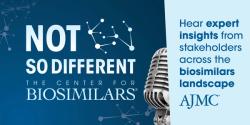© 2026 MJH Life Sciences™ and The Center for Biosimilars - Biosimilars, Health Economics & Insights. All rights reserved.
Hans-Christian Kolberg, MD: The Importance of Reporting Data on Biosimilar Trastuzumab
Hans-Christian Kolberg, MD, head of the department of obstetrics and gynecology, breast cancer center, and gynecologic cancer center at Marienhospital Bottrop, Germany, reflects on the importance of reporting new cardiac data from the LILAC trial of ABP 980, a trastuzumab biosimilar.
Transcript
I think it is very important to keep reporting these things because, even for people doing oncology for years and decades, it’s still very difficult to really differentiate between a generic medication and a biosimilar. A generic is simply like cooking the same recipe, and developing a biosimilar is completely different. It’s really developing a new medication; you just do it the other way around. It is reverse-engineering because you have to find out what the original company was doing.
The effect regarding healthcare economics is that, of course, you can sell that cheaper because developing a new antibody is an investment of more than $1 billion usually, whereas developing a biosimilar for a known antibody costs about $200 million dollars.
So actually the prices in the end are cheaper, which is of course important in countries like the United States or in Germany, where I work, because we save money we can use for other things in the healthcare system. But it's even more important in places where giving a patient an antibody is not a question because there's no money for that. Like in the developing countries. For those, biosimilars may be a huge chance to gain access to antibodies at all.



